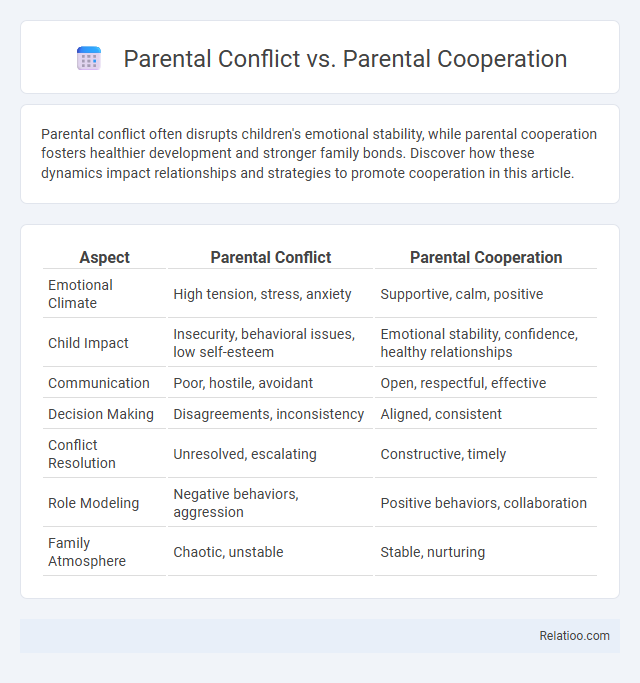Parental conflict often disrupts children's emotional stability, while parental cooperation fosters healthier development and stronger family bonds. Discover how these dynamics impact relationships and strategies to promote cooperation in this article.
Table of Comparison
| Aspect | Parental Conflict | Parental Cooperation |
|---|---|---|
| Emotional Climate | High tension, stress, anxiety | Supportive, calm, positive |
| Child Impact | Insecurity, behavioral issues, low self-esteem | Emotional stability, confidence, healthy relationships |
| Communication | Poor, hostile, avoidant | Open, respectful, effective |
| Decision Making | Disagreements, inconsistency | Aligned, consistent |
| Conflict Resolution | Unresolved, escalating | Constructive, timely |
| Role Modeling | Negative behaviors, aggression | Positive behaviors, collaboration |
| Family Atmosphere | Chaotic, unstable | Stable, nurturing |
Understanding Parental Conflict: Definitions and Dynamics
Parental conflict involves ongoing disagreements and hostile interactions between caregivers, negatively impacting children's emotional well-being. Parental cooperation entails collaborative efforts and effective communication to manage parenting responsibilities, fostering a supportive environment for child development. Disruption occurs when conflict undermines consistent caregiving, leading to instability and potential behavioral issues in children.
The Roots and Causes of Parental Disagreement
Parental conflict often stems from differences in parenting styles, communication breakdowns, and unresolved personal issues, which can hinder cooperative decision-making. Parental cooperation arises when both parents prioritize the child's well-being, fostering open dialogue and mutual respect despite differing viewpoints. Disruption in parenting typically results from ongoing disputes, lack of trust, and inconsistent boundaries, negatively impacting family stability and child development.
Negative Effects of Parental Conflict on Children
Parental conflict significantly increases the risk of emotional and behavioral problems in children, such as anxiety, depression, and aggressive behavior. Chronic exposure to parental discord disrupts secure attachment and negatively impacts cognitive development and social skills. Studies reveal that children in high-conflict families face lower academic achievement and higher rates of substance abuse compared to those raised in cooperative parenting environments.
Parental Cooperation: Building a Unified Front
Parental cooperation fosters a nurturing environment that significantly enhances children's emotional well-being and stability by promoting consistent communication and shared decision-making. Unified parenting approaches reduce behavioral issues and improve academic performance by providing clear expectations and supportive boundaries. Research indicates that children benefit most when parents actively collaborate, presenting a cohesive front that mitigates the negative impacts of conflict and disruption.
Benefits of Parental Cooperation for Child Development
Parental cooperation fosters a stable and nurturing environment that directly supports your child's emotional and cognitive development. Consistent communication and shared parenting goals enhance your child's sense of security, leading to improved social skills and academic performance. Reducing conflict through cooperation minimizes stress and behavioral issues, promoting overall well-being and resilience.
Communication Strategies for Resolving Parental Conflict
Effective communication strategies for resolving parental conflict involve active listening, clear expression of feelings, and empathy to foster parental cooperation and minimize disruption. You can enhance these strategies by using neutral language, setting boundaries for respectful dialogue, and focusing on common goals related to child well-being. Consistent application of these techniques promotes a stable environment, reducing emotional stress and improving overall family dynamics.
Co-Parenting After Separation: Conflict vs. Cooperation
Parental cooperation after separation significantly benefits children's emotional well-being by providing consistent support and reducing stress, while ongoing parental conflict often leads to increased behavioral issues and anxiety in children. Effective co-parenting requires clear communication, mutual respect, and prioritizing the child's needs over personal grievances, ensuring stability despite family restructuring. Your ability to foster cooperation rather than conflict directly impacts your child's adjustment and long-term psychological health post-separation.
The Role of Emotional Intelligence in Parental Collaboration
Emotional intelligence significantly enhances parental collaboration by enabling effective communication, empathy, and conflict resolution between co-parents, reducing destructive parental conflict. High emotional intelligence fosters cooperative parenting environments that prioritize children's well-being and promote stable, supportive family dynamics. Disruption in parental relationships often correlates with low emotional intelligence, where misunderstandings and emotional outbursts impede constructive cooperation.
Practical Tips to Foster Parental Cooperation
Fostering parental cooperation involves clear communication, consistent co-parenting strategies, and prioritizing the child's well-being over personal conflicts. Establishing regular, respectful dialogue helps parents align on decisions about education, healthcare, and daily routines, reducing misunderstandings and conflict. Utilizing mediation services and parenting plans can further enhance collaboration and stability in the child's environment.
Moving Forward: Creating a Positive Family Environment
Parental cooperation fosters a positive family environment by promoting consistent communication and emotional stability, which supports children's well-being and development. In contrast, parental conflict and disruption increase stress levels and negatively impact children's emotional health and academic performance. Moving forward involves prioritizing collaborative problem-solving and mutual respect to create a nurturing atmosphere that facilitates resilience and healthy family dynamics.

Infographic: Parental Conflict vs Parental Cooperation
 relatioo.com
relatioo.com